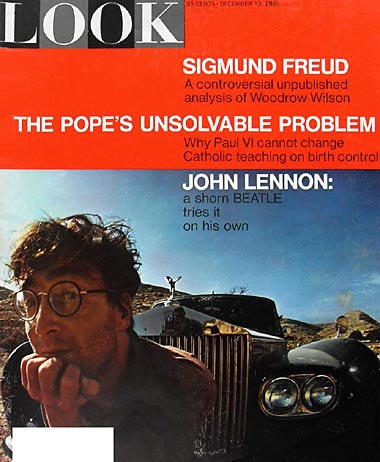John Lennon Interview: Look Magazine 12/13/1966 (Part One)
In the fall of 1966, Look magazine's European editor Leonard Gross and photographer Douglas Kirkland visited John Lennon on-location during the filming of 'How I Won The War.'
The article, entitled 'John Lennon: A Shorn Beatle Tries It On His Own', would be published in Look magazine's December 13th 1966 issue.
John Lennon was chosen for this film role by director Richard Lester who had directed Lennon previously in the Beatles' first two films, 'A Hard Day's Night' in 1964 and 'Help!' in 1965.
The Look article is Gross's firsthand account of events on the movie set. It also contains extended excerpts of conversations with John Lennon, which have been highlighted in blue for easier referencing.
Whoever would have dreamed that beneath that mop lurked a Renaissance man? Yet there, shorn, sits John Lennon, champion minstrel, literary Beatle, coarse truthsayer, who turned Christendom on with one wildly misunderstood gibe at cant. Now, face white, tunic red, playing wounded in a field of weeds, this pop-rock De Vinci is proposing to act for real. Relaxed to all appearances, he is all knots inside.
"I was just a bundle of nerves the first day. I couldn't hardly speak I was so nervous. My first speech was in a forest, on patrol. I was suppose to say, 'My heart's not in it any more' and it wasn't. I went home and said to myself, 'Either you're not going to be like that, or you're going to give up.'"
As he casts his weak brown eyes at the camera, the entire movie company jockeys for a glimpse. "I don't mind talking to the camera -- it's people that throw me."
Sure enough, he blows his lines. He waggles his head in shame. "Sorry about that." But under the low-key coaxing of Director Dick Lester, Beatle John becomes Private Gripweed, a complex British orderly, in an unorthodox new film, How I Won The War.
Lennon on his own -- rich for life at 26, yet poor still in what men of all seasons crave -- full knowledge of himself. Beatling by itself, he has found, is not enough. "I feel I want to be them all-- painter, writer, actor, singer, player, musician. I want to try them all, and I'm lucky enough to be able to. I want to see which one turns me on. This is for me, this film, because apart from wanting to do it because of what it stands for, I want to see what I'll be like when I've done it."
They stood silently in the deserted German square that Sunday morning, three young British actors costumed like the soldiers who had taken the town 22 years before. Then the one whose notorious locks had recently been chopped short observed, "I haven't seen so much fresh air together for about four years."
For John Lennon, the Beatles' leader, it had been one swift crazy ride to the top. But now, there were distortions, and he had recoiled. Grownups were twisting a Beatles' kids' song into an LSD trip -- an ingenious lament that he and Beatle Paul McCartney had polished off one wild night was, current rumor had it, actually the synopsis of an opera so bitter it could not be sung. A passing remark about religious hypocrisy had made Lennon a devil or a saint, depending on your tastes. Others might enjoy them, but to Lennon, who is nothing if not honest, the distortions had become a threat.
"I don't want people taking things from me that aren't really me. They make you something that they want to make you, that isn't really you. They come and talk to find answers, but they're their answers, not us. We're not Beatles to each other, you know. It's a joke to us. If we're going out the door of the hotel, we say, 'Right! Beatle John! Beatle George now! Come on, let's go!' We don't put on a false front or anything. But we just know that leaving the door, we turn into Beatles because everybody looking at us sees the Beatles. We're not the Beatles at all. We're just us."
"But we made it, and we asked for it to an extent, and that's how it's going to be. That's why George is in India (studying the sitar,) and I'm here. Because we're a bit tired of going out the door, and the only way to soften the blow is just to spread it a bit."
In that kind of mood, a Dick Lester set was just the therapy for Lennon. Each man is the kind who makes the New Theologians jump. To them, the individual is more thrill than threat -- a unique being who should be taken for what he is. Lester, who directed both Beatle films, gratefully recalls his first meeting with the group, when the movies were just an idea. "They allowed me to be what I damn well pleased. I didn't have to put on an act for them, and they didn't put one on for me."

